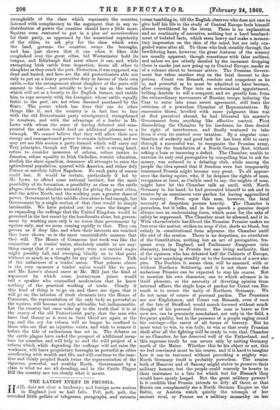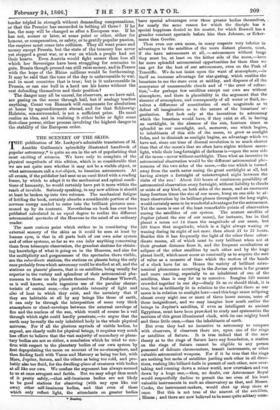THE LATEST EVENT IN PRUSSIA.
'HAIL does not clear a landscape, and foreign news arrives 11 in England just as hail falls. Pelt, pelt, pelt, the wretched little pellets of telegrams, paragraphs, and extracts come tumbling in, till the English observer who does not care to give half his life to the study of Central Europe feels himself almost bewildered by the storm. There is no explanation and no continuity of narrative, nothing but a hard bombard- ment of isolated facts, which seem heavy and make a momen- tary impression on the skin of the mind, but are only con- gealed water after all. To those who look steadily through the bewildering haze, however, the great features of the scenery are usually apparent, though sometimes with false outlines, and unless we are utterly dazzled by the incessant dropping there is smoke just now going up in Central Europe, smoke as of a volcano about to become active. The Prussian Govern- ment has taken another step on the fatal descent to des- potism. Count von Bismark, resolute and competent as he is, and powerful as he must be admitted to have become, after coercing the Pope into an ecclesiastical appointment, bribing Austria to sell a conquest, and we greatly fear, from the extraordinary movements of Russian troops, inducing the Czar to enter into some secret agreement, still fears the criticism of a powerless Chamber of Representatives. By successive blows, levelled with more judgment than was at first perceived abroad, he had liberated his master's Government from anything like effective control. First discrediting the Chamber by his insolence, he then denied its right of interference, and finally ventured to take from it even its control over taxation. By a singular com- bination of audacity and good luck he has been able to carry through a successful war, to reorganize the Prussian army, and to lay the foundation of a North German fleet, without asking a loan or incurring a deficit. The Chamber, unable to exercise its only real prerogative by compelling him to ask for money, was reduced to a debating club, while among the people the idea spread that if freedom were but temporarily renounced Prussia might become very great. To all appear- ance the daring squire, who, if he despises the rights of man, recognizes at least, as Carlyle used to say, the mights of man, might have let the Chamber talk on until, with North Germany in his hand, he had presented himself to ask and to receive by an unanimous vote pardon for having aggrandized his country. Even upon this man, however, the fatal necessity of despotism presses heavily. The Chamber is powerless, but it talks, and in free speech a genuine despot always sees an undermining force, which must for the sake of safety be suppressed. The Chamber must be silenced, and it is. With characteristic hardihood the Prussian Premier makes no fuss over the matter, strikes no coup d'itat, sheds no blood, but calmly in constitutional form adjourns the Chamber until the end of the session. There is no despotism, no overthrow of the Constitution, nothing but an act of prerogative, fre- quent even in England, and Parliament disappears into obscurity, leaving in Prussia but one living authority, that of the squireen who has defeated half the Cabinets of Europe, and is now marching steadily on to the formation of a new em- pire. The Duchies, it seems clear, will be annexed, with or without Northern Schleswig, and it is not there that the audacious Premier can be expected to stay his course. Not to mention his own character, one to which advance is in itself pleasure, or the necessity of diverting opinion from internal affairs, the single hope of pardon for Count von Bis- mark is to secure the unity of Northern Germany. We do not mean of course of personal pardon. The Prussians are not Englishmen, and Count von Bismark, even if sure of the fate of Strafford, would march forward without much thought of his personal future. The man is brave as few men are, can be genuinely nonchalant, not only in the field, a frequent quality, but in the presence of a people raging round his carriage—the rarest of all forms of bravery. But he must want to win, to win fully, to win so that every Prussian shall after all the fighting still be ready to vote that, Chamber or no Chamber, he has deserved well of the 'Fatherland, and this supreme result he can secure only by uniting Germany north of the Maine. Whether this be his object or not, this we feel convinced must be his course, and it is hard to imagine how it can be traversed without provoking a mighty war. North Germany itself is probably powerless. The armies both of Hanover and of Saxony might strive to preserve their military honour, but the people could scarcely be hearty in their resistance to a fate for which but for Bismark they would have openly longed. But the great military powers Is it credible that Prussia intends to defy all three, or that Russia can complacently see a North German Empire on the Baltic, or Austria watch quietly the triumph of her ancient rival, or France see a military monarchy on her border tripled in strength without demanding compensations, or that the Premier has 'succeeded in bribing all three l If he has, the map will be changed as after a European war. If he has not, sooner or later, at some point or other, either for honour, or compensation, or safety, or to gratify popular passion, the empires must come into collision. They all want peace and money except Prussia, but the state of the treasury has never yet stopped a great war, or a war on which a people had set their hearts. Even Austria would fight sooner than lose all which her Sovereigns have been struggling for centuries to gain, Russia though pressed can still raise money, and in France with the hope of the Rhine millions would be forthcoming. It may be said that the tone of the day is unfavourable to war, and in most countries that is true; but is it unfavourable in Prussia, or can one bull in a herd use his horns without the rest defending themselves and their position I
The danger may all be unreal, for observers, as we have said, are gazing on the scene through hail, but if analogy teaches anything, Count von Bismark will compensate for absolutism at home by aggrandizement abroad, and for that Schleswig- Holstein, sea-surrounded, is not a sufficient prize. He must realize an idea, and in realizing it either bribe or fight some first-class power, either process involving the highest danger to the stability of the European order.































 Previous page
Previous page